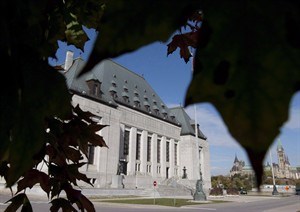
The Supreme Court of Canada is seen in Ottawa on October 2, 2012. THE CANADIAN PRESS/Adrian Wyld
April 24, 2014 - 9:43 AM
OTTAWA - When the Supreme Court hands down its advice Friday on what it will take to reform or abolish the Senate, it will answer five questions asked by the federal government:
1.Can the federal government unilaterally limit the term served by senators?
The government asked the court to consider various options, including term limits of nine years, 10 or more years, eight or fewer years, terms covering life of two or three Parliaments, and whether the term could be renewable.
The Harper government argues that it can unilaterally impose term limits. Ontario agrees, provided the term is nine or more years. Saskatchewan agrees, provided the term is more than 10 years. All other provinces say the move would require a constitutional amendment supported by seven provinces with 50 per cent of the population (the 7-50 amending formula).
2. Can the federal government unilaterally create a consultative election process for choosing whom to appoint to the Senate?
Or
3. Can the federal government establish a framework to enable provinces to create their own consultative election process?
The federal government says it can unilaterally create an election process. Alberta and Saskatchewan agree, all other provinces say the 7-50 amending formula would apply.
4. Can the federal government unilaterally repeal the constitutional requirement that a senator must own $4,000 worth of property in the province he or she is appointed to represent?
Federal and all provincial governments, except Quebec, say yes. Quebec, the only province in which senators are actually appointed to specific electoral districts, says its consent is required.
5. Would abolition of the Senate require the consent of seven provinces representing 50 per cent of the population or unanimous consent?
The federal government, British Columbia, Saskatchewan and Alberta says 7-50 is sufficient. All other provinces say unanimity is required.
News from © The Canadian Press, 2014